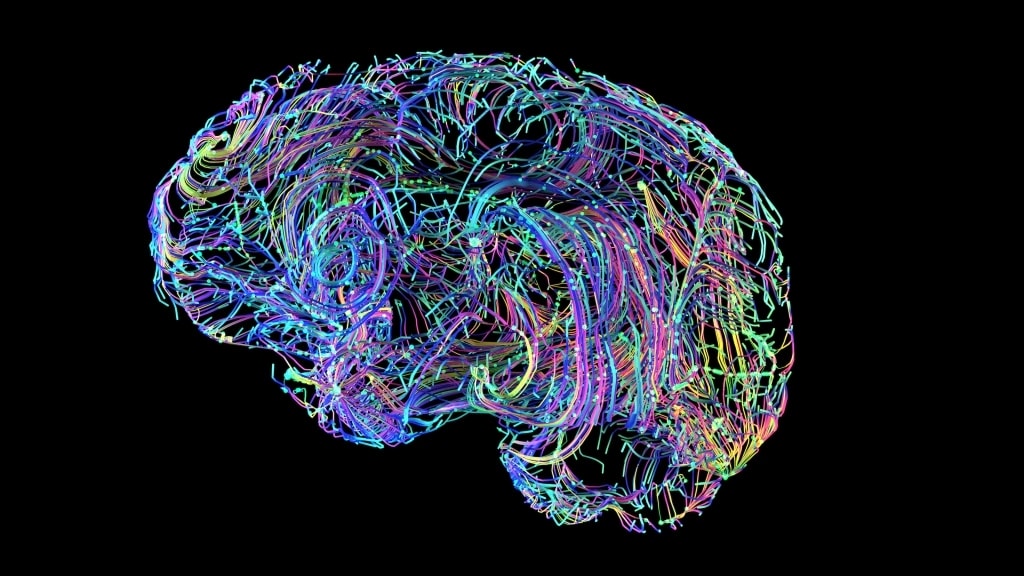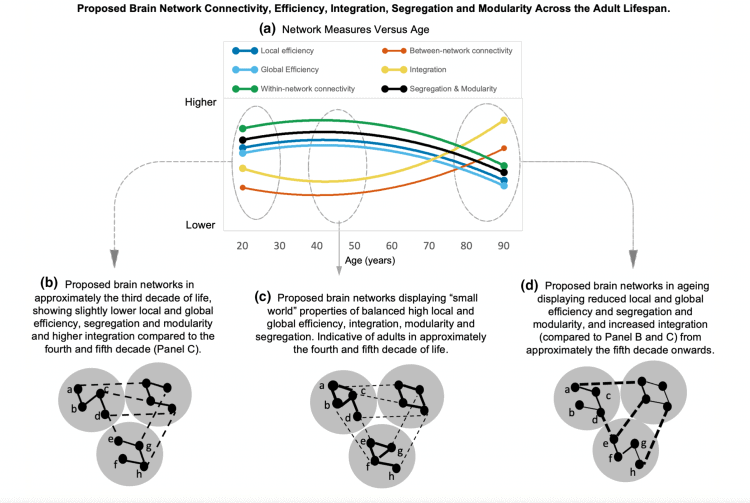
In the fifth decade of life, our brains start to undergo a radical “rewiring” that results in diverse networks becoming more integrated and connected over the ensuing decades, with accompanying effects on cognition. The networking changes likely result from the brain reorganizing itself to function as well as it can with dwindling resources and aging “hardware.” Proper diet, regular exercise, and a healthy lifestyle can keep the mind in good working order and put networking changes on hold, sometimes well into old age.
In a systematic review recently published in the journal Psychophysiology, researchers from Monash University in Australia swept through the scientific literature, seeking to summarize how the connectivity of the human brain changes over our lifetimes. The gathered evidence suggests that in the fifth decade of life (that is, after a person turns 40), the brain starts to undergo a radical “rewiring” that results in diverse networks becoming more integrated and connected over the ensuing decades, with accompanying effects on cognition.
Since the turn of the century, neuroscientists have increasingly viewed the brain as a complex network, consisting of units broken down into regions, sub-regions, and individual neurons. These units are connected structurally, functionally, or both. With increasingly advanced scanning techniques, neuroscientists can observe the parts of subjects’ brains that “light up” in response to stimuli or when simply at rest, providing a superficial look at how our brains are synced up.
The Monash University team pored over 144 studies which used these imaging techniques to probe the brains of tens of thousands of subjects. From this analysis, the researchers gleaned a general trend in how the networked brain changes over our lifetimes.
Early on, in our teenage and young adult years, the brain seems to have numerous, partitioned networks with high levels of inner connectivity, reflecting the ability for specialized processing to occur. That makes sense, as this is the time when we are learning how to play sports, speak languages, and develop talents. Around our mid-40s, however, that starts to change. Instead, the brain begins becoming less connected within those separate networks and more connected globally across networks. By the time we reach our 80s, the brain tends to be less regionally specialized and instead broadly connected and integrated.

This “rewiring” has tangible effects on cognition.
“Older adults tend to show less flexible thinking, such as forming new concepts and abstract thinking, lower response inhibition, as well as lower verbal and numeric reasoning,” the reviewers noted. “These executive function changes can be seen first in adults in their fifth decade of life, consistent with the findings of the systematic review that functional network connectivity changes reach their inflection point in the fourth and fifth decade.”
But the news isn’t all bad for the aging brain. “Tasks relying on predominantly automatic or well-practiced processes are less impacted by age or may even increase slightly across the lifespan, such as vocabulary and general knowledge,” the authors wrote.
So why do these brain networking changes even occur in the first place? The reviewers offered some learned speculation. They noted that the brain is a resource-hungry organ, ravenous for the simple sugar glucose. “The adult brain accounts for approximately 2% of total body weight but requires approximately 20% of total glucose supply,” they wrote.
But as we get older, our bodies tend to slow down and the brain becomes less efficient. So not only is the brain getting less glucose, it’s also not putting the fuel to good use. Thus, the networking changes likely result from the brain reorganizing itself to function as well as it can with dwindling resources and aging “hardware.”
Proper diet, regular exercise, and a healthy lifestyle can keep the mind in good working order and put networking changes on hold, sometimes well into old age.
The brain’s inner workings are mysterious indeed, but with this grand systematic review comprising hundreds of studies and tens of thousands of brain scans, we are at least starting to get a surface view of how it changes across our lifetimes.
“During the early years of life, there is a rapid organization of functional brain networks. A further refinement of the functional networks then takes place until around the third and fourth decade of life. A multi-faceted interplay of potentially harmful and compensatory changes can follow in aging,” the reviewers concluded.
